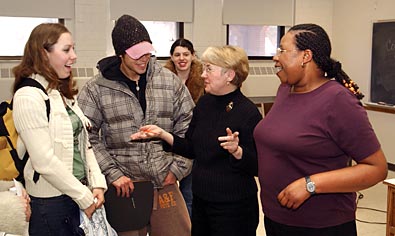Inside Iowa State
Inside ArchivesSubmit newsSend news for Inside to inside@iastate.edu, or call (515) 294-7065. See publication dates, deadlines. About InsideInside Iowa State, a newspaper for faculty and staff, is published by the Office of University Relations. |
March 11, 2005 Support for would-be facultyby Samantha Beres Iowa State's Preparing Future Faculty (PFF) program is for students like Dusan Palic. He headed a biology lab in his home country of Serbia and taught gifted high school seniors and college students. When he came to Iowa State to work on his doctoral degree, he learned that things are different. "I didn't know how U.S. academia worked," he said, adding that the PFF program has taught him well. Since its inception three and a half years ago, PFF has developed into a hybrid program through its use of workshops, panel discussions and faculty mentors. Last spring it was moved under the umbrella of the Center for Excellence in Learning and Teaching. Currently, the program admits 35 students a year, roughly half the number who apply. 
PFF student Jane Rose Njue (right) and her mentor Sedahlia Crase, human development and family studies (center), visit with undergraduates after class. Crase and Njue have worked together since spring semester 2004. Photo by Bob Elbert. Students, like Palic, take credit courses to learn how to prepare for the future. "We've had workshops where deans ask us questions that would be asked in a real interview," Palic said. "They also told us what they would like to see on an application -- little tricks that make you a lot more competitive once you're out there in the job market." PFF program director Donna Kienzler said that PFF is a supplement to graduate programs. "The major professor is there to nurture research and turn students into scholars and they do that great," she said. "I'm trying to pick up some of the loose ends so that when they go become professors, they have an advantage." The loose ends vary. Kienzler said about a quarter of her students didn't know the process of tenure. She added, students may not think to ask major professors if they can borrow a syllabus, or ask lab directors for resource lists -- things that could save a lot of time once they are on their own. She calls these things survival skills. Kienzler doesn't pick up the loose ends alone. There are 70 students enrolled in PFF this year, and about as many faculty members who volunteer their time. Some speak to classes or sit on panels. Panel discussions and workshops run the gamut and include diversity in the classroom, balancing academia with family, how to write a grant and even how to save for retirement. Other faculty help PFF students get teaching experience and act as mentors. Students are encouraged to find mentors other than their major professor so they gain other perspectives. Mentors meet with their students every two weeks. Professor of human development and family sciences Sedahlia Crase has mentored two students in the program. She explained that often the biweekly meeting overlaps with a subject in a PFF class. "One topic might be promotion and tenure," she said. "We talk a lot about it. How do you go about it? What works? How it might go and how it doesn't always go." She said that the mentoring in general helps students see all angles of the job. Also, because many students stay in touch with their mentors, it keeps them connected to Iowa State. Palic said his faculty mentor was a crucial element of the program for him. "He was really supportive of showing me how to do things in the classroom," he said, adding the way a lab is run in the United States differs from how he ran his in Serbia. "We also built a really great relationship and I can say that we became friends," said Palic, who added the best thing that came out of PFF for him is the confidence he'll have when he goes on his first interview. |
SummaryPFF has developed into a hybrid program through its use of workshops, panel discussions and faculty mentors. |